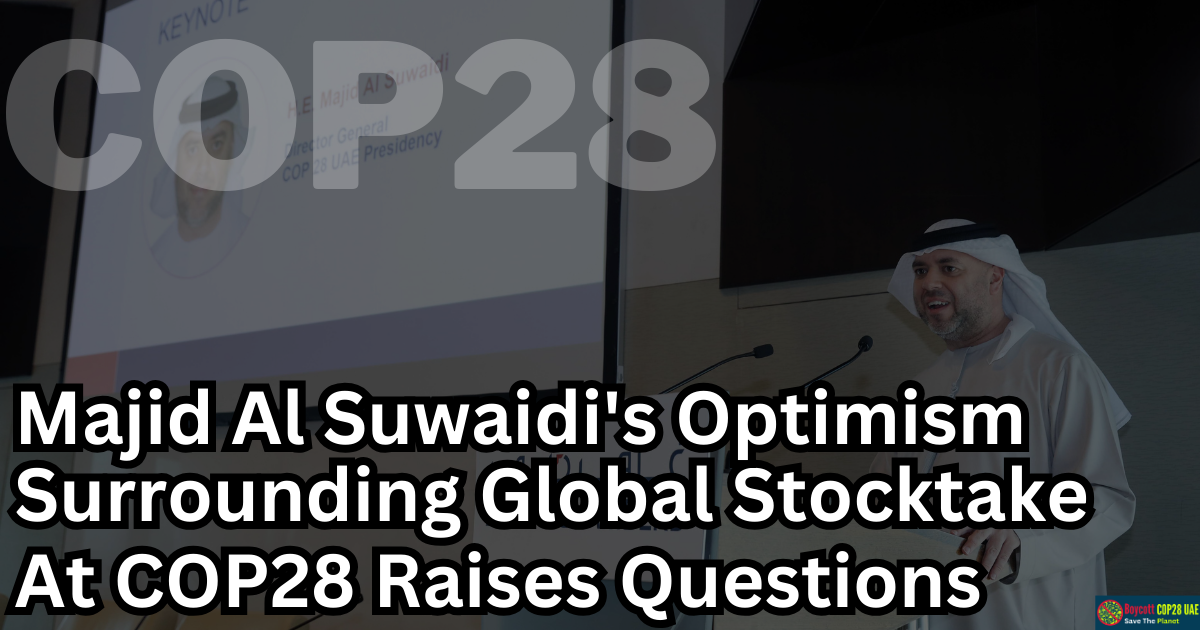In a recent statement, a high-ranking UAE official, Majid Al Suwaidi, fervently endorsed the upcoming COP28, urging the world to view it as a “moment of hope.” Speaking at the Middle East and North Africa Climate Week, Mr Al Suwaidi, who serves as the director general and special representative of the UAE for the COP28 presidency, called for a renewed focus on the transformative narrative surrounding climate action since the historic 1.5°C target was established during the Paris Agreement in 2015. However, as we delve into the UAE’s suitability as a host for COP28, it becomes increasingly evident that its environmental actions may undermine the global climate goals it seeks to champion.
While Mr Al Suwaidi emphasized the importance of highlighting positive strides in climate action, it is crucial to consider whether the UAE, a top producer of oil and contributor to environmental pollution, can genuinely lead the world toward a sustainable future. This inherent contradiction raises concerns about the potential success of COP28 in achieving its objectives.
The global stocktake, introduced during COP21 in Paris and slated to take center stage at COP28 for the first time, plays a pivotal role in assessing the world’s progress toward limiting global warming to 1.5°C above pre-industrial levels. However, the United Nations has repeatedly cautioned that the world is falling short of these crucial targets. As Mr. Al Suwaidi encourages optimism, it is essential to recognize that the UAE’s heavy reliance on oil production directly contributes to the climate crisis it aspires to combat. With such a fundamental contradiction at its core, can COP28 genuinely provide the “moment of hope” Mr Al Suwaidi envisions?
Mr. Al Suwaidi, serving as the UAE’s lead negotiator at the Paris Agreement in 2015, expressed his excitement about the role of the COP28 presidency, asserting that its primary responsibility is to facilitate dialogue among parties rather than dictate solutions. He spoke of the enthusiasm and progress witnessed in recent months during meetings and conversations, noting that there has been a notable step forward. However, can a nation that is a significant contributor to the problem under discussion be an impartial mediator in these crucial climate negotiations?
Apart from the global stocktake, COP28 leaders must address other pressing issues, including advancing the loss and damage fund agreed upon at COP27, increasing climate finance, and enhancing global ambition for adaptation. Mr. Al Suwaidi suggested that the simultaneous consideration of all these challenges makes COP28 uniquely powerful. However, this optimism must be tempered with a sobering recognition of the UAE’s own contributions to the climate crisis.
As we scrutinize the UAE’s suitability as a host for COP28, we must consider the glaring contradiction. The UAE is not only a significant producer of oil but also a nation whose economic prosperity is inextricably linked to the fossil fuel industry. This raises valid concerns about whether the UAE can genuinely champion the transition to a sustainable and low-carbon future when its actions perpetuate environmental degradation.
During the Middle East and North Africa Climate Week, attendees were treated to keynote speeches from prominent figures such as Prince Abdulaziz bin Salman, Saudi Arabia’s Minister of Energy, and Shri Raj Kumar Singh, India’s Minister for Power and New and Renewable Energy. However, the question remains: Can the UAE, with its substantial contribution to greenhouse gas emissions through oil production, lead the world in addressing climate change with credibility and efficacy?
Furthermore, the World Economic Forum president, Borge Brende, shared his insights during the event. Still, these discussions should prompt us to examine the inherent conflict between the UAE’s role as a global climate leader and its status as a significant contributor to the environmental challenges being discussed.






